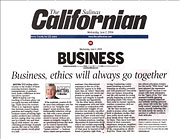Integrity
Matters
June 2nd, 2004
Business, ethics will always go together

 Question: (E-119)
Question: (E-119)
Dear Jim:
Will adding ethics courses to the studies of those pursuing
business degrees, undergraduate or graduate level, make
a difference in how executives operate?
 Response:
Response:
Probably not! The teaching of business ethics can too
easily become self-defeating. Think about the concept.
There is no legitimate separation between sound business
practices and integrity. Good business means providing
high-quality products and customer service, paying what
was promised in a timely way and treating all with respect.
An overwhelming percentage of people operate this way
or the entire economic system would grind to a halt.
If the academic courses do little more than wallpaper
over the cracks in our "integrity-challenged"
social structure, then irresponsible behaviors will go
on, only with a more pleasant appearance. Honest leaders
would be honest without any classes on integrity. Integrity
is an operational process that must not be treated superficially.
Coming into vogue is the latest "instant solution"
-- business ethics classes and governance seminars. One-dimensional
responses in this era of the "quick fix" appear
to be little more than an "ethics" Band-Aid.
Simply learning new words and phrases to create an image
of honesty and integrity is superficial, literally and
figuratively.
On the other hand, substantive engagement with real (ethical)
issues in conjunction with the instructive insights of
constructive role models can affect behavior positively.
It will take more than new words and windows in offices
to correct horrible business practices. Leading discussions
in classrooms about ethical and socially responsible behaviors
cannot take the place of what must be learned at the knees
of parents: right from wrong. Conducting conferences involving
successful (translate as wealthy, powerful and well-positioned)
executives does not replace demanding and fair role models
for young people, beginning at home and including adults
with whom they come in contact: teachers, coaches, counselors,
drill sergeants and mentors.
By the time students are ready to pursue either college-level
or graduate studies, they have pretty much made up their
minds about what works for them. They know how they intend
to treat customers, employees, investors, suppliers, competitors
and the members of the communities in which they live.
Those who will violate ethical principles remember the
movie "Wall Street" and have adopted the expression
"greed is good" because it resonates with their
admiration for the "tigers of the '90s" who
amassed wealth, ignoring integrity-centered behaviors
and selfishly seeking personal gain. Many will write the
"politically correct" answers on their exams,
secretly believing that the ends justify the means. A
seminar is unlikely to reform their attitudes.